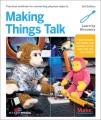Results 11 to 17 of 17 | « previous
- Making things talk / by Igoe, Tom.;
 Includes Internet addresses and index.LSC
Includes Internet addresses and index.LSC- Subjects: Programmable controllers.; Natural language processing (Computer science); Interactive computer systems.; Robots.;
- Available copies: 1 / Total copies: 1
-
unAPI
- Arduino for dummies / by Nussey, John.;
 Includes Internet addresses and index.LSC
Includes Internet addresses and index.LSC- Subjects: Arduino (Microcontroller); Microcontrollers; Programmable controllers.; Open source software.; Electronics;
- © c2013., John Wiley,
- Available copies: 0 / Total copies: 1
-
unAPI
- 30 Arduino projects for the evil genius / by Monk, Simon.;
 LSC
LSC- Subjects: Programmable controllers.; Microcontrollers; Science projects; C (Computer program language).;
- © c2010., McGraw-Hill,
- Available copies: 1 / Total copies: 1
-
unAPI
- Hacking electronics : learning electronics with Arduino and Raspberry Pi / by Monk, Simon.;
 LSC
LSC- Subjects: Electronics; Arduino (Programmable controller); Raspberry Pi (Computer);
- Available copies: 1 / Total copies: 1
-
unAPI
- Make : JavaScript robotics / by Waldron, Rick,(Computer programmer);
 LSC
LSC- Subjects: Robots; Robots; JavaScript (Computer program language);
- Available copies: 1 / Total copies: 1
-
unAPI
- Digital minimalism : choosing a focused life in a noisy world / by Newport, Cal,author.;
 Includes bibliographical references and index.Minimalism is the art of knowing how much is just enough. Digital minimalism applies this idea to our personal technology. It's the key to living a focused life in an increasingly noisy world. In this timely and enlightening book, the bestselling author of Deep Work introduces a philosophy for technology use that has already improved countless lives. Digital minimalists are all around us. They're the calm, happy people who can hold long conversations without furtive glances at their phones. They can get lost in a good book, a woodworking project, or a leisurely morning run. They can have fun with friends and family without the obsessive urge to document the experience. They stay informed about the news of the day, but don't feel overwhelmed by it. They don't experience "fear of missing out" because they already know which activities provide them meaning and satisfaction. Now, Newport gives us a name for this quiet movement, and makes a persuasive case for its urgency in our tech-saturated world. Common sense tips, like turning off notifications, or occasional rituals like observing a digital sabbath, don't go far enough in helping us take back control of our technological lives, and attempts to unplug completely are complicated by the demands of family, friends and work. What we need instead is a thoughtful method to decide what tools to use, for what purposes, and under what conditions. Drawing on a diverse array of real-life examples, from Amish farmers to harried parents to Silicon Valley programmers, Newport identifies the common practices of digital minimalists and the ideas that underpin them. He shows how digital minimalists are rethinking their relationship to social media, rediscovering the pleasures of the offline world, and reconnecting with their inner selves through regular periods of solitude. He then shares strategies for integrating these practices into your life, starting with a thirty-day "digital declutter" process that has already helped thousands feel less overwhelmed and more in control. Technology is intrinsically neither good nor bad. The key is using it to support your goals and values, rather than letting it use you. This book shows the way.
Includes bibliographical references and index.Minimalism is the art of knowing how much is just enough. Digital minimalism applies this idea to our personal technology. It's the key to living a focused life in an increasingly noisy world. In this timely and enlightening book, the bestselling author of Deep Work introduces a philosophy for technology use that has already improved countless lives. Digital minimalists are all around us. They're the calm, happy people who can hold long conversations without furtive glances at their phones. They can get lost in a good book, a woodworking project, or a leisurely morning run. They can have fun with friends and family without the obsessive urge to document the experience. They stay informed about the news of the day, but don't feel overwhelmed by it. They don't experience "fear of missing out" because they already know which activities provide them meaning and satisfaction. Now, Newport gives us a name for this quiet movement, and makes a persuasive case for its urgency in our tech-saturated world. Common sense tips, like turning off notifications, or occasional rituals like observing a digital sabbath, don't go far enough in helping us take back control of our technological lives, and attempts to unplug completely are complicated by the demands of family, friends and work. What we need instead is a thoughtful method to decide what tools to use, for what purposes, and under what conditions. Drawing on a diverse array of real-life examples, from Amish farmers to harried parents to Silicon Valley programmers, Newport identifies the common practices of digital minimalists and the ideas that underpin them. He shows how digital minimalists are rethinking their relationship to social media, rediscovering the pleasures of the offline world, and reconnecting with their inner selves through regular periods of solitude. He then shares strategies for integrating these practices into your life, starting with a thirty-day "digital declutter" process that has already helped thousands feel less overwhelmed and more in control. Technology is intrinsically neither good nor bad. The key is using it to support your goals and values, rather than letting it use you. This book shows the way.- Subjects: Self-help publications.; Information technology; Internet addiction; Technological innovations;
- Available copies: 1 / Total copies: 1
-
unAPI
- No more nice girls : gender, power, and why it's time to stop playing by the rules / by McKeon, Lauren,author.;
 Includes bibliographical references and index."In the age of girl bosses, Beyoncé, and Black Widow, we like to tell our little girls they can be anything they want when they grow up, except they'll have to work twice as hard, be told to "play nice," and face countless double standards that curb their personal, political, and economic power. Today, long after the rise of girl power in the 90s, the failed promise of a female president, and the ubiquity of feminist-branded everything, women are still a surprisingly, depressingly long way from gender and racial equality. It's worth asking: Why do we keep trying to win a game we were never meant to play in the first place? Award-winning journalist and author Lauren McKeon examines the varied ways in which our institutions are designed to keep women and other marginalized genders at a disadvantage and shows us why we need more than parity, visible diversity, and lone female CEOs to change this power game. She uncovers new models of power-- ones the patriarchy doesn't get to define-- by talking to lawyers insisting on gender-neutral change rooms in courthouses, programmers creating apps to track the breakdown of men and women being quoted in the news media, educators illustrating tampon packaging with pictures of black bodies, mixed martial artists teaching young girls self-empowerment, entrepreneurs prioritizing trauma-informed office cultures, and many other women doing power differently. As the toxic, divisive, and hyper-masculine style of leadership gains ground, threatening democracy here and abroad, McKeon underscores why it's time to stop playing by the rules of a rigged game. No More Nice Girls charts a hopeful and potent path forward for how to disrupt the standard (very male) vision of power, ditch convention, and build a more equitable world for everyone."--
Includes bibliographical references and index."In the age of girl bosses, Beyoncé, and Black Widow, we like to tell our little girls they can be anything they want when they grow up, except they'll have to work twice as hard, be told to "play nice," and face countless double standards that curb their personal, political, and economic power. Today, long after the rise of girl power in the 90s, the failed promise of a female president, and the ubiquity of feminist-branded everything, women are still a surprisingly, depressingly long way from gender and racial equality. It's worth asking: Why do we keep trying to win a game we were never meant to play in the first place? Award-winning journalist and author Lauren McKeon examines the varied ways in which our institutions are designed to keep women and other marginalized genders at a disadvantage and shows us why we need more than parity, visible diversity, and lone female CEOs to change this power game. She uncovers new models of power-- ones the patriarchy doesn't get to define-- by talking to lawyers insisting on gender-neutral change rooms in courthouses, programmers creating apps to track the breakdown of men and women being quoted in the news media, educators illustrating tampon packaging with pictures of black bodies, mixed martial artists teaching young girls self-empowerment, entrepreneurs prioritizing trauma-informed office cultures, and many other women doing power differently. As the toxic, divisive, and hyper-masculine style of leadership gains ground, threatening democracy here and abroad, McKeon underscores why it's time to stop playing by the rules of a rigged game. No More Nice Girls charts a hopeful and potent path forward for how to disrupt the standard (very male) vision of power, ditch convention, and build a more equitable world for everyone."--- Subjects: Equality.; Feminism.; Power (Social sciences); Sex discrimination against women.; Social control.; Women; Women's rights.;
- Available copies: 1 / Total copies: 1
-
unAPI
Results 11 to 17 of 17 | « previous